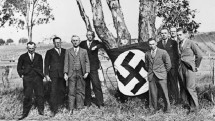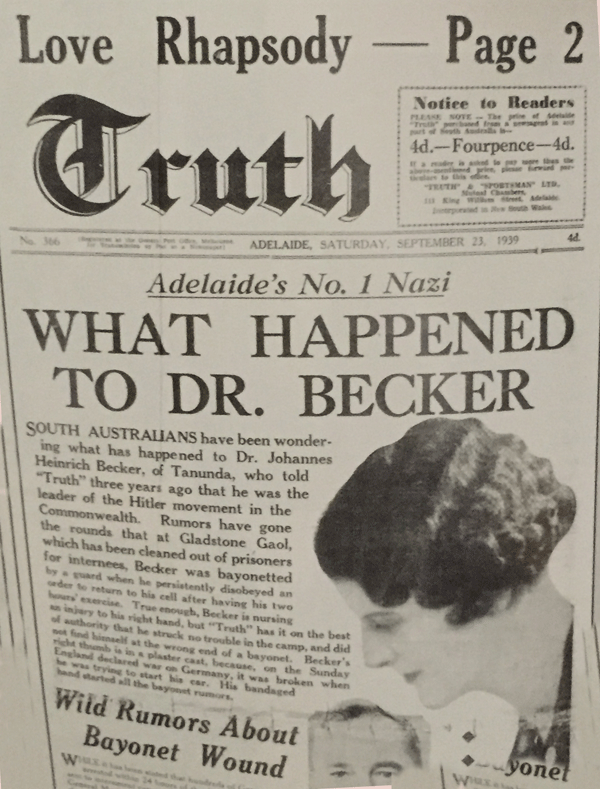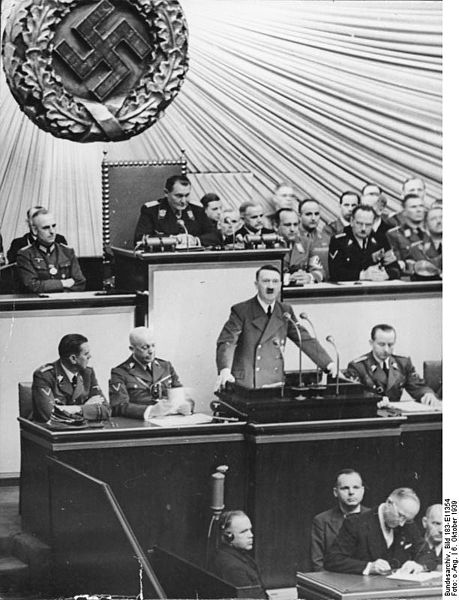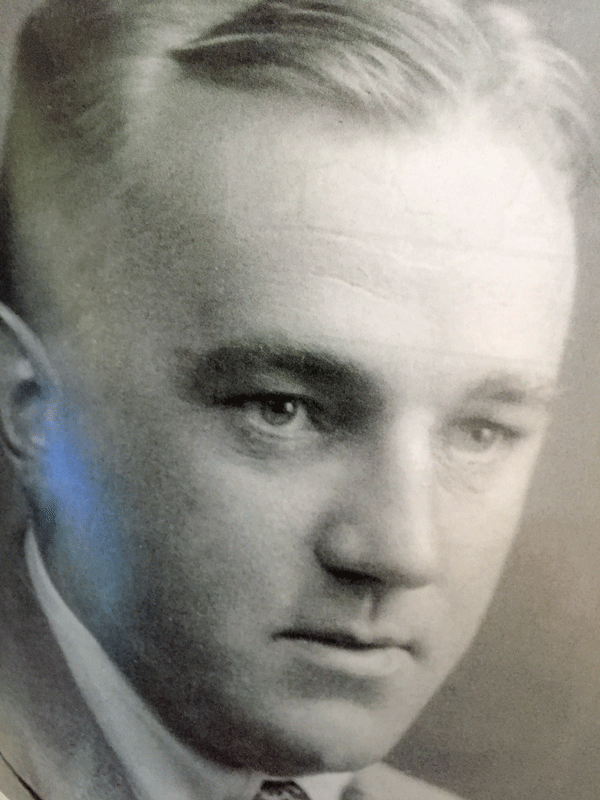The Hitler Club

(by Gary Gumpl and Richard Kleinig) (2007)
It’s not easy being a Kraut. Hitler saw to that. He took more than two thousand years of German contributions to the world – legacies from sources such as Beethoven, Bonhoeffer, Brahms, Charlemagne, Marlene Dietrich, Dürer, Einstein, Friedrich, Goethe, Hesse, Hoffmann, Kant, Kleist, Liebniz, Luther, Mann, Mozart, Schiller, Schubert, and yes, Wagner (especially Wagner) – and sullied them, perhaps for ever. The ‘don’t mention the war’ running joke in that Fawlty Towers episode is closer to the truth than we care to admit. In modern Germany especially, the shadow cast by Nazism is long.
Grotesque irony abounded in the Nazis’ world. For example, Himmler rattled around in a special train that served as both his billet and his office, all the while trying to prove scientifically that the Reich’s Japanese allies were really Aryran. The mottos hanging above some of the infamous death camps were “Arbeit macht Frei” – Work will set you Free (at Auschwitz and elsewhere), and “Jedem das Seine” – To Each Their Due (at Buchenwald). “The Nazis are a joke all right, but they are not yet a joke to make lightly. They are history’s joke on the human race, and will remain so until the last of their victims has gone beyond the reach of being hurt further by a casual insult.’* And yet, as Jakov Lind pointed out, there were no Nazis. Just people, with terrible views, empowered to do terrible things. Plenty supported them. Or joined them. Gunther Grass recalled that “[a]s a member of the Hitler Youth I was, in fact, a Young Nazi. A believer till the end. Not what one would call fanatical, not leading the pack, but with my eye, as if by reflex, fixed on the flag that was to mean ‘more than death’ to us, I kept pace in the rank and file. No doubts clouded my faith…I saw my fatherland threatened, surrounded by enemies.”^
The authors of The Hitler Club have grasped this essential point. In this fine, important and gutsy book, they demonstrate that many Anglos, as well as Germans, here and abroad, thought for rather a long time that Hitler was the cat’s pyjamas. Indeed, the early warnings by the likes of Churchill were an exception. Germany had, after all, been devastated by the Great War and had salt rubbed in its wounds by the Treaty of Versailles. Demilitarisation and the Great Depression sowed the seeds of reaction; then along came Adolf, in the guise of the Man of the People, promising a chicken in every pot and a VW in every garage. The local Australian press echoed and amplified the naivety of the English press: “Hitler’s methods of violence were…provisionally sanctioned by British and ultimately Australian press sources as necessary, but only temporary, evils that were really masking palliatives. They were legitimised, because they were thought to be correctives being applied by a sick body politic which was somehow engaged in the tolerable process of healing itself.”^^
When Nazi Germany set itself against the world, leading inexorably to self-immolation, the reaction was, inevitably and understandably, savage. But at a local level, there tended to be an overreaction, bearing a lack of proportion and an arbitrariness emblematic of foolish figures of authority. The Hitler Club is the story of the impact of Nazism in the German settlements of the Barossa Valley in South Australia, and the victimisation of a man who (like so many) believed in Hitler, but who appears to have committed no crime. It is described as “a story of immigration, of an Australia in formation, of the complexity of loyalties and the juggling of the old and new…most of all, in the hands of two South Australian magistrates, it is a story of injustice that must never be allowed to be forgotten.”
Gary Gumpl and Richard Kleinig, present and former Stipendiary Magistrates of long experience and sound reputation, have uncovered a shameful example of extra-judicial overreach and institutionalised prejudice. Dr Johannes Becker (born 1898) served his country in WWI, heard Herr Hitler at Hofbrauhaus over pretzels and beer in 1922, migrated to Australia in 1927, commenced medical practice in the Barossa, joined the National Socialist German Workers’ Party in 1932 and became, upon Hitler’s ascension, state leader for the South Pacific and head of the Tanunda branch of the party. There seems no doubt that he was a strident and committed Nazi. The photo of what became referred to in local intel circles as ‘The Hitler Club,’ showing several men with the swastika in front of a vineyard near Tanunda (see main image) is attributed to Becker. What is missing is evidence of crime or criminality, despite exhaustive searches of previously classified government security files and many other accurate sources.
It is true that he practised as a medical practitioner in Australia without obtaining registration, although his patients thought well of him. He sued the publisher of Smith’s Weekly for its article, “German Quack runs riot on the Murray Flats” and won a judgment in the SA Supreme Court (the publisher’s appeal to the High Court was dismissed in 1932, although the damages award was reduced). Apart from that, there seems to be nothing against him. Yet following the outbreak of World War II, Dr Becker was interned (for 7 years!) as an enemy alien, in SA and Tatura in Victoria. He was arrested the day after England and thus Australia declared war on Germany, yet the local cop, in defiance of authority, did not house him in the police cell on his last night before internment.
We should notice, as the authors establish, that the power to imprison without charge, let alone trial, was a historical right reserved to the Crown and recognized by the High Court as apt in times of war…but nevertheless, a pretty raw deal. The authors quote Alexander Hamilton on the hallowed taste of tyrants for arbitrary imprisonment, and The Varnished Culture has itself spoken of the dangerous and formidable powers to imprison per se. In Becker’s case, the Crown banged-up a man who had done no crime and had lost his official post a decade earlier. And yet…and yet…
He made pleas for release during his confinement, which fell on deaf ears. Eventually he got a ‘hearing’ before the Aliens’ Deportation Tribunal – its very name a grim portent – in late 1945 (note: half a year after Hitler’s fall had left Germany without any pots or garages). There had been no real case for internment and there was certainly no case for deportation. Naturally therefore, His Honour, Justice Simpson (former Director-General of the Australian Security Service, hence combining a former prosecutorial role with his judicial one), acting upon nothing but what C.P. Snow memorably termed “the brilliance of suspicion”, ordered deportation. To call His Honour’s judgment flawed would be putting it mildly. As Magistrates Gumpl and Kleinig put it, “the Judge’s impressionistic, loose-woven, unfair and unsubstantiated reasons…did not even bother to mention the fact that Becker had never come under suspicion for criminal conduct that was prejudicial to national security. …his permanent exclusion was infinitely easier than trying to prove a case against Dr Becker, especially where such a case did not exist and the Australian authorities knew it.”^*
On Becker’s release in 1946, pending deportation, he embarrassingly went AWOL, and was eventually arrested as a stowaway on a ship lying off Watson’s Bay, Sydney, bound for Panama. He was deported to West Germany, where he got exoneration by a ‘denazification’ tribunal in December 1948 despite (of perhaps because of) the disappearance of a dossier on his Australian activities. In 1953 Becker’s marriage was dissolved in South Australia. Survived by his son and daughter, he died on 21 February 1961 at Bremen, West Germany. He never saw Australia or his family again.
 As might be expected from authors steeped in the traditions of the Law, the book separates the fact from the fancy, with forensic exactitude, and is informed by an instinctive feel for natural justice. This story is manifestly of relevance today; indeed, it is timeless, in that human societies must continually watch over (and re-set where necessary) rules of human conduct and liberties, always balancing social cohesion against individual freedom. Freedom comes from common consent among society as to what constitutes fairness and decency. Societies are judged by their actions having regard to such criteria. Australia failed that test in this case. Its deprivation of Becker’s fundamental civil liberties was done with actual malice and absent “some compelling evidence implicating him and his cohort in behaviour that was at least preparatory to the commission of some serious criminal offending…the case against Becker was a will-o’-the-wisp.”^^^
As might be expected from authors steeped in the traditions of the Law, the book separates the fact from the fancy, with forensic exactitude, and is informed by an instinctive feel for natural justice. This story is manifestly of relevance today; indeed, it is timeless, in that human societies must continually watch over (and re-set where necessary) rules of human conduct and liberties, always balancing social cohesion against individual freedom. Freedom comes from common consent among society as to what constitutes fairness and decency. Societies are judged by their actions having regard to such criteria. Australia failed that test in this case. Its deprivation of Becker’s fundamental civil liberties was done with actual malice and absent “some compelling evidence implicating him and his cohort in behaviour that was at least preparatory to the commission of some serious criminal offending…the case against Becker was a will-o’-the-wisp.”^^^
“Perhaps the most significant moral characteristic of a nation is its hypocrisy.” – Reinhold Niebuhr, Moral Man and Immoral Society (1932) p.95.
“We hold these truths to be self-evident, that all men are created equal, that they are endowed by their Creator with inherent and unalienable rights, that among these are life, liberty, and the pursuit of Happiness.” – Thomas Jefferson, “Declaration of Independence” (1776)
“The implication underlying totalitarian democracy, that freedom could not be granted as long as there is an opposition or reaction to fear, renders the promised freedom meaningless.” – J. L. Talmon, The Origins of Totalitarian Democracy (1952) p.254.
“No one shall be subjected to arbitrary arrest, detention or exile.” “Everyone is entitled in full equality to a fair and public hearing by an independent and impartial tribunal, in the determination of his rights and obligations and of any criminal charge against him.” “Everyone has the right to freedom of opinion and expression; this right includes freedom to hold opinions without interference and to seek, receive and impart information and ideas through any media and regardless of frontiers.” “Everyone has the right to freedom of peaceful assembly and association.” – U.N. Universal Declaration of Human Rights (1948), Articles 9, 10, 18 and 20 (1).]
Leave a comment...
While your email address is required to post a comment, it will NOT be published.




5 Comments